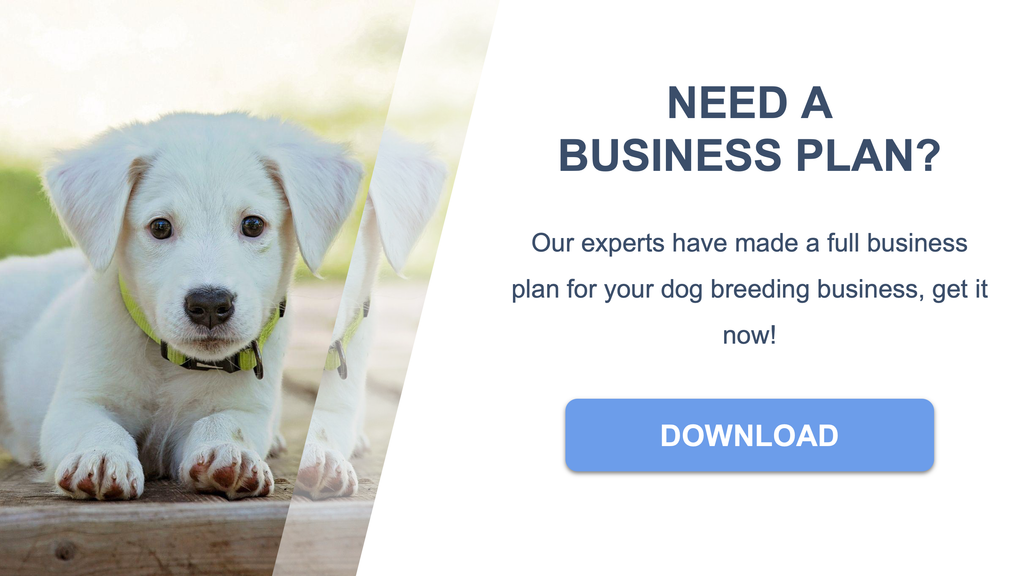This article was written by our expert who is surveying the industry and constantly updating the business plan for a dog breeder.

Starting a dog breeding business requires careful financial planning and a thorough understanding of the various costs involved.
From licensing requirements to breeding stock acquisition, facility setup to marketing, each aspect demands significant investment to ensure both legal compliance and business success.
If you want to dig deeper and learn more, you can download our business plan for a dog breeder. Also, before launching, get all the profit, revenue, and cost breakdowns you need for complete clarity with our dog breeder financial forecast.
Starting a dog breeding business in 2025 requires considerable upfront investment across multiple categories, from licensing to breeding stock acquisition.
Understanding these costs is essential for creating an accurate business plan and ensuring financial stability through your first breeding cycles.
| Cost Category | Typical Investment Range | Key Components | Frequency |
|---|---|---|---|
| Licensing & Legal Requirements | $500-$2,500 | Business registration, breeder licenses, local permits | Annual/Multi-year |
| Breeding Stock | $3,000-$15,000+ | Quality registered dogs with documented lineage | Initial investment |
| Veterinary & Health Testing | $1,500-$5,000 | Genetic testing, health certifications, preventive care | Pre-breeding/Annual |
| Facility & Infrastructure | $25,000-$50,000 | Kennel construction, climate control, sanitation systems | Initial with maintenance |
| Breeding Equipment | $3,000-$8,000 | Whelping boxes, monitoring equipment, supplies | Initial with replacements |
| Ongoing Maintenance | $600-$2,400 per dog annually | Food, grooming, routine veterinary care | Monthly/Annual |
| Marketing & Professional Services | $2,500-$7,000 | Website, photography, legal/accounting services | Initial with ongoing costs |
| Emergency Reserve | $10,000-$15,000 | Unexpected veterinary care, business contingencies | Maintained constantly |

What licenses, permits, or certifications are legally required to start operating as a dog breeder?
Dog breeding businesses require specific licenses and permits that vary by location, with stricter regulations being implemented in 2025.
At the federal level, breeders with more than three breeding females who sell puppies wholesale need a USDA license under the Animal Welfare Act. This involves an application process, facility inspection, and annual fees ranging from $40-$760 based on your operation size.
At the state and local levels, requirements vary significantly. Most jurisdictions require a general business license ($50-$400), a specific dog breeder license ($100-$1,000 annually), and often a kennel license if housing multiple dogs. Many regions have introduced mandatory breeder identification numbers and annual reporting requirements as of 2025.
You'll find detailed market insights in our dog breeder business plan, updated every quarter.
For staff qualifications, many jurisdictions now require at least one person with formal training in animal care (Level 2-3 certification) to oversee welfare compliance. Facilities must maintain specific staff-to-dog ratios, typically one staff member per 20 adult dogs, and undergo regular inspections.
What are the typical upfront costs for acquiring breeding dogs of high quality and registered pedigree?
| Quality Level | Cost Range | What You're Getting | Considerations |
|---|---|---|---|
| Show-Quality Breeding Stock | $3,000-$10,000+ per dog | Champion bloodlines, perfect breed standard conformation, extensive health testing, full breeding rights | Highest potential return on investment, most marketable puppies, premium pricing potential |
| Pet-Quality with Breeding Rights | $1,500-$3,000 per dog | Registered purebred with good health testing, minor conformational flaws, breeding rights included | Good balance of investment vs. return, solid foundation for breeding program |
| Breeding Pairs | $5,000-$15,000 per pair | Complementary dogs selected for genetic diversity and trait improvement | Often more cost-effective than purchasing individually, ensures compatibility |
| Breed-Specific Considerations | Varies widely | Rare breeds command premium prices (French Bulldogs: $5,000-$15,000; German Shepherds: $2,500-$7,000) | Investment should align with market demand and puppy price potential |
| Additional Acquisition Costs | $500-$2,000 | Transportation, health certificates, import fees for international dogs | Often overlooked in budgeting but can be substantial |
| Male vs. Female Investment | Females: higher initial cost Males: potentially higher lifetime value |
Females: direct production capacity Males: can sire multiple litters |
Strategic approach often includes investing more in high-quality females and one exceptional male |
| Registration Papers & Transferability | $100-$500 additional | Full registration with breeding rights vs. limited registration | Ensure all paperwork clearly transfers breeding rights to you as the new owner |
What are the expected veterinary expenses, including vaccinations, health checks, genetic testing, and emergency care, before the first litter is sold?
Pre-breeding veterinary expenses represent one of the most significant investments for new dog breeders and are essential for ethical breeding practices.
Comprehensive pre-breeding health screenings typically cost $700-$1,650 per breeding dog. These include breed-specific tests like hip/elbow evaluations for larger breeds ($300-$500), cardiac screenings ($250-$400), ophthalmological exams ($200-$350), and thyroid testing ($150-$200). Most reputable breed organizations now require these certifications before registration.
Genetic testing has become more sophisticated and accessible in 2025, with comprehensive DNA panels ranging from $150-$1,000 depending on the number of conditions tested. These tests identify carriers for hereditary conditions specific to your breed and help create strategic breeding pairs that minimize genetic disorders.
This is one of the strategies explained in our dog breeder business plan.
Routine preventive care includes vaccinations ($75-$200 annually), wellness exams ($50-$100 per visit), parasite prevention ($20-$50 monthly), and dental care ($300-$700 annually). For pregnant females, additional costs include pre-whelping exams ($100-$200), progesterone testing for breeding timing ($75-$100 per test), and potential emergency cesarean sections ($1,500-$3,000).
Most successful breeders establish an emergency fund of $10,000-$15,000 specifically for unexpected veterinary expenses, as complications with pregnancy or puppies can quickly escalate into thousands in medical costs.
What are the ongoing food, supplements, and grooming costs per dog, and how should these be budgeted annually?
- Premium Food Costs: $480-$1,800 annually per adult dog depending on size, breed, and quality. Breeding females require specialized nutrition during pregnancy and lactation, increasing costs by 30-50% during these periods. Puppies require high-quality growth formulas costing $150-$300 per puppy until sale.
- Supplements and Preventatives: $200-$400 annually per dog for joint supplements, omega fatty acids, probiotics, and breed-specific nutritional support. Breeding dogs may require additional reproductive supplements costing $100-$200 during breeding seasons.
- Parasite Prevention: $250-$500 annually per dog for heartworm, flea, tick, and intestinal parasite prevention. Professional breeding facilities require comprehensive parasite management programs to prevent outbreaks.
- Professional Grooming: $360-$1,200 annually per dog for professional grooming services, varying significantly by breed. Long-coated breeds like Poodles or Shih Tzus require monthly professional grooming ($60-$100 per session), while short-coated breeds may need quarterly sessions.
- Grooming Supplies: $200-$500 annually for in-house grooming tools, including professional-grade dryers, clippers, shampoos, and maintenance supplies. Investment in quality equipment reduces long-term costs.
- Dental Care: $200-$600 annually per dog for dental products and occasional professional cleanings, critical for breeding dogs as dental disease can impact overall health and breeding fitness.
- Budgeting Approach: Successful breeders allocate 20-30% of anticipated revenue per dog for these maintenance costs, tracking expenses carefully to identify cost-effective approaches while maintaining optimal health and condition.

What housing or kennel infrastructure is required, including construction, fencing, heating, cooling, and sanitation systems, and what is the estimated cost?
Professional kennel infrastructure represents the largest single investment for a dog breeding business, with costs varying based on scale, quality, and local regulations.
A standard professional kennel facility of approximately 1,000 square feet costs $25,000-$50,000 for new construction. This typically includes individual indoor/outdoor runs, a whelping area, quarantine space, storage, and a grooming station. Renovating existing structures can reduce costs to $15,000-$30,000 but may require additional modifications to meet regulations.
Climate control systems are essential and cost $5,000-$15,000 for proper HVAC installation that maintains appropriate temperatures for all seasons. Breeding facilities require specialized ventilation systems ($3,000-$7,000) that provide 10-20 air exchanges per hour to prevent disease transmission while maintaining comfortable conditions.
Proper drainage and sanitation systems cost $3,000-$10,000 and include sloped concrete floors, trench drains, proper waste management systems, and specialized non-porous wall coverings. These features are critical for meeting health department requirements and reducing disease risks.
We cover this exact topic in the dog breeder business plan.
Fencing and outdoor exercise areas typically cost $3,000-$8,000 for secure, properly divided spaces with appropriate surfacing and shade structures. Most jurisdictions require double-fence systems to prevent escapes and unwanted breeding.
What breeding equipment, whelping supplies, and puppy care materials are essential, and what is their average total cost?
| Category | Essential Items | Cost Range | Considerations |
|---|---|---|---|
| Whelping Equipment | Professional whelping boxes (2-3), heat lamps, digital thermometers, surveillance cameras | $800-$2,500 | Quality whelping boxes ($300-$700 each) should have proper flooring, cleanable surfaces, and piglet rails to prevent crushing |
| Monitoring Technology | Wireless temperature sensors, wifi cameras, puppy scales, health monitoring devices | $500-$1,500 | 24/7 monitoring capabilities can prevent emergencies and save litters |
| Medical Supplies | Hemostats, scissors, suction bulbs, heating pads, emergency medical kits, oxygen supplementation | $400-$1,200 | Professional breeders maintain hospital-grade supplies for emergency situations |
| Record-Keeping Systems | Specialized breeding software, identification systems, microchips, record books | $300-$800 | Critical for maintaining breeding records, health histories, and pedigree information |
| Puppy Feeding Equipment | Milk replacers, feeding bottles, tube feeding kits, weaning dishes, food scales | $200-$600 | Necessary for orphaned puppies or supplemental feeding situations |
| Socialization Equipment | Puppy playpens, socialization items, training tools, enrichment devices | $300-$800 | Critical for proper development of puppies prior to sale |
| Sanitation Equipment | Commercial washers/dryers, steam cleaners, disinfection systems, bedding supplies | $500-$2,000 | Professional breeding facilities require hospital-grade sanitation capabilities |
| Transportation Equipment | Vehicle crates, temperature-controlled transport systems, puppy delivery kits | $300-$1,000 | Safe transportation is essential for veterinary visits and puppy deliveries |
What are the expected costs for registering the kennel name and each litter with official breed associations or registries?
Registration costs with breed associations and kennel clubs represent ongoing expenses that vary based on the breeds you work with and your kennel's registration status.
Registering your kennel name with major organizations like AKC, UKC, or international registries costs $100-$300 as a one-time fee. This establishes your kennel prefix that will appear in the registered names of puppies you produce. Premium or protected name registrations may cost an additional $100-$200.
Litter registration fees range from $25-$85 per litter, with additional costs of $25-$50 per puppy for individual registration certificates. Most registries offer bulk registration discounts for professional breeders. DNA verification, increasingly required for certain breeds, adds $40-$100 per dog to the registration process.
Additional registration costs include champion title recording fees ($25-$75), pedigree certificates ($25-$50 each), and certified pedigree research ($100-$300). Specialized breed clubs often require separate membership fees ($50-$150 annually) and may have their own registration requirements.
International registrations for breeders working with global bloodlines add $100-$250 per transaction, plus potential translation services costs. Maintaining membership in multiple registries can cost $200-$500 annually but increases your puppies' marketability.

What marketing and advertising costs should be anticipated, including website creation, online listings, photography, and branding?
Effective marketing is essential for dog breeders to attract qualified puppy buyers and command premium prices for their puppies.
Professional website development costs $1,500-$3,000 for a custom-designed site with breeding program information, available puppy listings, application forms, and mobile optimization. Ongoing website maintenance and hosting add $200-$500 annually. E-commerce functionality for deposits or merchandise adds $500-$1,000 to initial development.
Professional photography is crucial and costs $300-$800 per session for high-quality images of your breeding dogs and puppies. Video production for virtual tours or puppy updates adds $500-$1,500 depending on complexity. These visual assets significantly impact buyer perception of your breeding program's quality.
Breed-specific online listing sites charge $20-$100 per litter listing or $150-$500 for annual breeder profiles. Premium placement on these platforms can double these costs but often generates higher-quality inquiries. Social media management tools and targeted advertising cost $100-$300 monthly for effective campaigns.
Branding materials including logo design, business cards, puppy packets, and branded merchandise typically cost $800-$2,000 initially. These materials establish your kennel's professional image and support premium pricing. Educational materials for puppy buyers add $300-$500 to marketing costs but improve buyer satisfaction and referrals.
What are the average insurance costs for liability, property, and veterinary coverage for a small-to-medium-sized breeding operation?
| Insurance Type | Coverage Details | Annual Cost Range | Risk Management Considerations |
|---|---|---|---|
| General Liability Insurance | Covers injuries to visitors, property damage claims, and legal defense costs | $500-$1,500 | Essential coverage even for home-based operations; costs increase with number of annual visitors and puppy sales volume |
| Professional Breeder Liability | Specialized coverage for breeding-specific risks including puppy health guarantees and breeding advice | $600-$2,000 | Premium depends on breed types (higher for breeds with known health issues), annual sales volume, and claim history |
| Property Insurance | Covers kennel facilities, equipment, and breeding stock against damage from fire, weather events, and theft | $800-$2,500 | Premiums based on facility value, location risk factors, and security measures; specialized riders needed for full breeding stock coverage |
| Business Interruption Insurance | Provides income replacement if breeding operations are halted due to covered property damage | $400-$1,000 | Critical for full-time breeders relying on consistent litter income; premium based on annual revenue |
| Mortality & Theft Insurance | Covers death or theft of valuable breeding animals | 3-8% of animal value annually | Essential for high-value breeding stock; requires professional valuation and health verification |
| Veterinary Fee Coverage | Reimburses emergency and unexpected veterinary expenses for breeding stock | $500-$1,500 per dog | Premiums vary by breed, age, and health history; typically excludes breeding-related procedures |
| Commercial Auto Insurance | Covers vehicles used for transporting dogs, delivering puppies, or other business activities | $600-$1,500 | Required if using vehicles for any business purposes; personal auto policies typically exclude business use |
| Workers' Compensation | Required coverage for operations with employees | $1,000-$3,000 per employee | Mandatory in most states when hiring employees; rates based on payroll and job duties |
What staff or labor costs should be considered, whether for part-time help, trainers, or handlers?
Labor costs often become necessary once a breeding operation exceeds 5-8 adult dogs, with the structure and scale of staffing depending on your breeding program's size and specialization.
Kennel assistants for cleaning, feeding, and basic care typically cost $15-$20 per hour for part-time help, translating to $15,000-$25,000 annually for 20 hours weekly. Regulatory requirements in many regions mandate at least one staff member per 20 adult dogs, and compliance with this ratio is essential for maintaining your breeding license.
Professional handlers for show dogs cost $75-$150 per show day plus expenses, or $1,500-$3,000 monthly for campaign management of multiple dogs. These professionals are essential if building champion bloodlines is part of your breeding program's marketing strategy.
Professional trainers for basic puppy socialization and training cost $40-$75 per hour, with specialized training programs running $500-$2,500 per dog. Many successful breeders include basic training in their puppy packages to command premium prices.
Administrative support for managing applications, communications, and record keeping costs $18-$25 hourly or $1,500-$2,500 monthly for part-time virtual assistance. This becomes necessary once your breeding program exceeds 3-4 litters annually.
What professional services expenses should be expected, such as accountants, lawyers, or industry consultants?
- Legal Services: $1,500-$3,500 initially for business formation, contract development, and compliance review. Ongoing legal services cost $200-$500 monthly or $1,000-$3,000 annually for contract updates, dispute resolution, and regulatory compliance. Specialized animal law attorneys typically charge $250-$400 hourly.
- Accounting Services: $1,000-$2,500 annually for basic bookkeeping, tax preparation, and financial statement preparation. More complex operations require monthly bookkeeping services at $200-$500 monthly. Tax planning strategies specific to breeding businesses can save significantly on tax liabilities.
- Breeding Program Consultants: $100-$300 hourly or $1,500-$5,000 for comprehensive program evaluations from breed specialists who assess your breeding stock, facilities, and breeding plans. These consultations can significantly accelerate your breeding program's development.
- Veterinary Consulting: $150-$300 hourly for specialized reproductive veterinarians who develop protocols for your specific breeding program. Retainer arrangements of $500-$1,000 monthly provide priority access during whelping emergencies.
- Business Coaching: $1,000-$3,000 for business plan development and $250-$500 monthly for ongoing coaching specific to the pet industry. These services help develop marketing strategies, pricing models, and growth plans.
Get expert guidance and actionable steps inside our dog breeder business plan.

What initial cash reserve is recommended to cover unexpected costs and ensure financial stability through at least the first breeding cycle?
Establishing an adequate cash reserve is critical for new dog breeding businesses due to the significant time gap between initial investment and first revenue generation.
Financial experts recommend a minimum operating reserve of $10,000-$15,000 specifically for unexpected veterinary emergencies. This covers potential C-sections ($1,500-$3,000), puppy emergencies ($500-$2,500 per incident), and maternal complications ($1,000-$5,000). This fund should be separate from your general business reserves.
For general business operations, maintain a cash reserve covering at least 6-12 months of operating expenses before expecting meaningful revenue. This typically ranges from $15,000-$40,000 depending on your operation's scale. First-year breeders should expect minimal or negative returns as they establish their program and reputation.
Working capital needs are particularly high in breeding businesses due to the reproductive cycle timing. From initial breeding to final puppy sale typically spans 4-6 months, during which expenses accumulate continuously while revenue remains delayed. Plan for at least three complete breeding cycles before expecting consistent positive cash flow.
Establishing separate reserve accounts for different purposes helps with financial discipline. Maintain dedicated funds for: emergency veterinary care ($10,000-$15,000), facility maintenance ($5,000-$10,000), and business continuity ($15,000-$30,000).
Conclusion
This article is for informational purposes only and should not be considered financial advice. Readers are encouraged to consult with a qualified professional before making any investment decisions. We accept no liability for any actions taken based on the information provided.
Starting a dog breeding business requires significant upfront investment across multiple categories, from licensing and facilities to breeding stock and emergency reserves.
By carefully planning for these expenses and maintaining adequate cash reserves, new breeders can build sustainable, ethical businesses that prioritize animal welfare while creating a viable long-term enterprise.
Sources
- The Kennel Club: Dog Breeding Licensing Regulations Report
- Carlisle Government: Dog Breeding Licenses
- NSW Pet Registry: Changes to Dog Breeding Laws
- UK Government: Animal Activities Licensing Guidance
- Dojo Business: Dog Breeding Profitability Analysis
- MyDogDNA: Dog Breeding Cost Breakdown
- We Love Pets: The Cost of Ethical Breeding
- Market Watch: Cost of Owning a Dog

